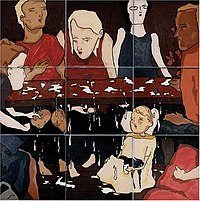
Band: Death Cab For Cutie
Album: Something About Airplanes
Best song: This is going to sound a little weird, considering "Line of Best Fit," "Pictures in an Exhibition," and "President of What" are classics, but I find "Your Bruise" to be one of Death Cab's five best songs.
Worst song: "The Face That Launched 1000 Shits" isn't great.
As I've written about before, one of the fun things about giving another listen to old(ish) records is to take oneself back to the time when the record was released.
I was first introduced to Death Cab through the band's second effort, the brilliant We Have the Facts and We're Voting Yes. I did not know of Something About Airplanes when it came out in August of 1998. Even if I wasn't deplugged from the music scene (I was), Something About Airplanes didn't make a huge splash outside of the band's home region of the Pacific Northwest. So, I didn't really know anything about it until the 2000.
Which is too bad.
Something About Airplanes is a wonderful, wonderful record. It has a pleasant rawness that the band later shed -- sadly -- for a more polished lyrical sound. The record -- made in a crappy studio space -- was rushed a bit and it sounds it. There is some tape hiss and some missed notes. Ben Gibbard is more nasal than pleasant. There are some production flourishes -- cello on "Bend to Squares" and "The Face That Launched 1000 Shits," a female duet from Abi Hall and some delay repeats on "Line of Best Fit," etc. -- but, the record is generally pretty stripped down.
A 17-year-old me was almost exclusively listening to wonky mainstream progressive rock -- mostly Genesis, Rush and Jethro Tull -- and melody-heavy indie rock. He made a ton of mixtapes for his then-girlfriend (hi, Alison!) with multiple Elliott Smith tracks. While Something About Airplanes doesn't fit in the first category, it absolutely satisfies the second. As I've written about the band many times, early Death Cab is mostly an extension of Elliott Smith's style (with the caveat that Death Cab is far more teenager-oriented and emo). The 17-year-old me would've adored Something About Airplanes.
---
Mountains have been written about Something About Airplanes, including the entirety of a liner note essay from the 10th anniversary reissue of the record. My recounting of the record is certainly overkill, so I want to simply repeat myself in a slightly modified way, as though I'm Rush Limbaugh.
Indeed, writing about "selling out" is like writing about the benefits of coffee enemas, margarine or the Atkins diet. No one believes it anymore and, ultimately, no one really cares. After all, the Arcarde Fire has had not one, but two (!) songs in trailers recently. Sam Beam sells his stuff for just about everything.
And, look, "selling out" is a concept that only indie rock snobs have ever cared about. It's mostly the Indie Rock Petes of the world ("Nothing is any good if other people like it.") who care about this crap. It's often tied to the notion of a band's lesser-known work being better than its earlier work.
So, the notion that Death Cab's first two records are better than the rest of their catalog isn't the worst notion in the history of the world. Some bands mature weirdly; Death Cab's third record is just as crappy as the band's major label debut. And the band's second recording for (2008's Narrow Stairs)Atlantic is just as good as some of the band's best work. Not everyone makes their best records last, like the Beatles basically did. But, not everyone made their best albums first, like Black Sabbath basically did. Some bands are scattered.
---
Something About Airplanes is somewhat immature. "Line of Best Fit" is a drawn-out long song. "Pictures in an Exhibition" has wonderful harmonies on the "I'm definitely shaking" chorus line. "President of What?" is an angry tell off of a song, with a wonderful sarcastic lyric. The "Amputations"/"Fake Frowns" dichotomy works in a near-perfect way. "Amputations" has a walking guitar line -- coupled with that ridiculous old newsreel sample -- while "Fake Frowns" is one of the Death Cab's hardest records.
"Your Bruise" is the highlight of the record, though. A melancholy guitar line revolves around a whispery lyric as Gibbard intones "It’s a backwards attraction to your forward eyes" to start the song. Gibbard name-checks Mary Timony and Plymouth Rock in the song, as the start-and-stop of the song slowly moves into a wonderful metaphor in a chorus:
I think your bruise was understated
Because you can’t feel this anymore
It’s getting bluer and you can’t keep faking
That you can’t feel this anymore
Broken hearts and self-denial are easy fodder for emotional lyrics. But, Gibbard's use of this metaphor is lovely and works perfectly with the wonderful Chris Walla guitar line.
---
I'm 28 right now and I love this album. But, I think this record would've really spoke to me as a 17-year-old. I love that nonsense and the tail end of my high school years were particularly emo (my home life was a little wacky). It's a striking record and one to behold. It really does paint the picture of the band's future very early.






